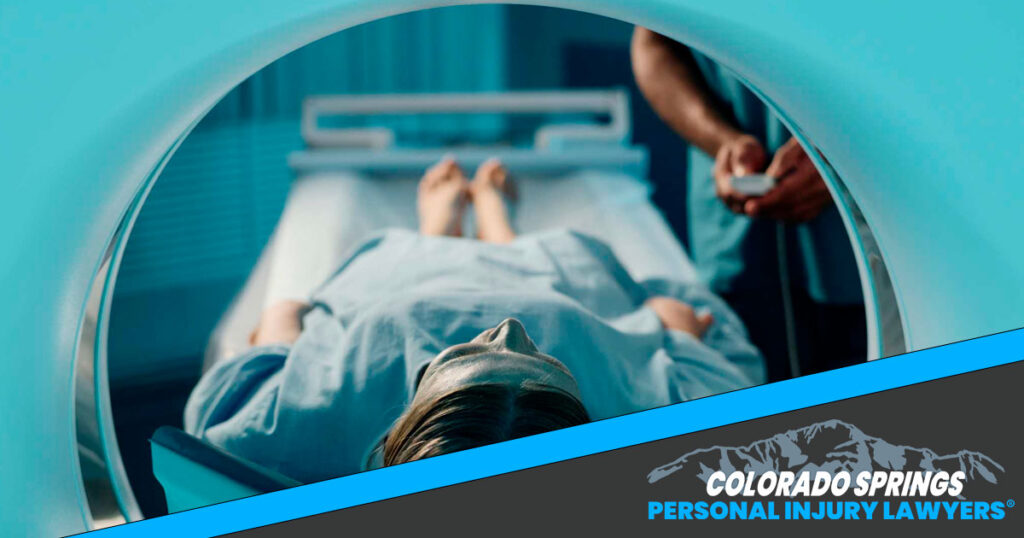Car accidents can cause injuries that aren’t immediately visible. Even if you feel fine, hidden injuries may appear days or weeks later. An MRI can detect internal damage and provide medical proof of your injuries.
At Colorado Springs Personal Injury Lawyers®, we’ve helped many clients who suffered delayed symptoms after car accidents. Understanding the role of an MRI can help protect your health and strengthen your injury claim.
Why an MRI Is Important After a Car Accident
After a crash, your body is in shock. Adrenaline can mask pain, making injuries harder to detect. While some injuries, like broken bones, are visible on X-rays, soft tissue injuries require more advanced imaging.
MRIs use powerful magnets and radio waves to create detailed images of muscles, ligaments, nerves, and the brain. Unlike X-rays or CT scans, MRIs can reveal subtle injuries that might otherwise go unnoticed, helping doctors diagnose and treat them properly.
What an MRI Can Reveal:
- Traumatic Brain Injuries (TBI) – Detects concussions, bleeding, or brain swelling.
- Spinal Cord Injuries – Identifies herniated discs, nerve damage, and fractures.
- Soft Tissue Damage – Reveals ligament tears, muscle strain, and joint issues.
- Internal Bleeding – Helps doctors locate bleeding that isn’t visible in a physical exam.
Even minor accidents can cause long-term damage. Without an MRI, serious injuries can go undiagnosed, leading to chronic pain and other complications.
Common Hidden Injuries After a Car Accident
Many injuries don’t show immediate symptoms. Days or even weeks later, you may develop pain, dizziness, or weakness. Here are some of the most common hidden injuries an MRI can detect:
1. Traumatic Brain Injuries (TBI)
A strong hit to the head can cause headaches, confusion, and memory loss. Some TBIs heal over time, while others lead to lasting cognitive issues. Long-term effects may include mood swings, difficulty concentrating, or even personality changes.
2. Whiplash and Soft Tissue Damage
When the head snaps forward and backward, it strains the neck. This can result in stiffness, limited mobility, and lingering pain. Many people dismiss whiplash as minor, but without treatment, it can cause chronic discomfort.
3. Spinal Cord Injuries
The spinal cord sends signals between your brain and body. If damaged, it can cause chronic pain, weakness, or even paralysis. Some spinal injuries worsen over time without proper medical care.
4. Herniated or Bulging Discs
The small discs in your spine act as cushions. If a disc slips or ruptures, it can press on nerves, causing back pain, numbness, or tingling. Without an MRI, this type of injury may go undiagnosed, leading to unnecessary suffering.
5. Internal Bleeding
A strong impact can damage internal blood vessels. Symptoms include bruising, dizziness, and weakness. Severe cases may require surgery. Since internal bleeding isn’t always obvious, early detection through an MRI can save lives.
When Should You Get an MRI?
Timing is crucial when it comes to getting medical attention after a car accident. Getting an MRI early can confirm injuries and help establish a direct link to the accident. Here’s when you should consider one:
Get an MRI Immediately If:
- You have severe pain, numbness, or weakness in any part of your body.
- You experience swelling, bruising, or dizziness after the crash.
- Your doctor suspects a serious brain, spine, or internal injury.
- You develop vision changes, ringing in the ears, or persistent headaches.
Wait for an MRI If:
- Your doctor recommends waiting for swelling to decrease before scanning.
- Your injuries seem minor but worsen over time.
- Symptoms like headaches or stiffness persist for more than a few days.
- You feel increasing pain in your joints or muscles as inflammation develops.
If symptoms appear later, schedule an MRI right away to prevent further complications.
What to Expect During an MRI Scan
If you’ve never had an MRI before, here’s what the process involves:
- The scan lasts between 30 to 60 minutes.
- You’ll lie on a table that slides into a large tube-like machine.
- You must stay still while the machine captures detailed images.
- Some scans require a contrast dye injection for clearer results.
- You may hear loud tapping noises, but earplugs or headphones can help.
If you have claustrophobia, ask about open MRI options to make the experience more comfortable.
How an MRI Helps Your Personal Injury Claim
Insurance companies often try to minimize payouts by downplaying injuries. An MRI provides clear medical evidence, making it harder for insurers to dispute your claim.
Benefits of an MRI in Your Case:
- Proves the severity of your injury to insurers and the court.
- Establishes a direct connection between the accident and your injuries.
- Prevents insurers from blaming pre-existing conditions for your pain.
- Justifies the need for ongoing medical treatment and therapy.
- Strengthens your ability to negotiate a higher settlement.
Without MRI evidence, insurance companies may offer lower settlements, claiming your injuries aren’t serious.
How Insurance Companies Try to Deny MRI Coverage
Insurance adjusters often look for ways to deny MRI coverage. They may argue:
- Your injuries aren’t serious enough to require an MRI.
- Your pain is from a pre-existing condition, not the accident.
- An X-ray was sufficient, so an MRI isn’t necessary.
- Your symptoms are exaggerated, meaning additional testing isn’t justified.
A Colorado Springs car accident attorney can challenge these denials and fight for your right to proper medical care.
How to Cover the Costs of an MRI After a Car Accident
Many accident victims worry about the cost of an MRI. However, there are multiple ways to cover the expense:
1. Health Insurance Coverage
If you have health insurance, your policy may cover some or all of the MRI costs. Contact your provider to confirm coverage and ask about co-pays or deductibles.
2. Using Your Auto Insurance Coverage
Many drivers in Colorado can use their auto insurance coverage to pay for medical expenses after an accident. Depending on your policy, this may include MedPay or other medical coverage options that help with diagnostic tests, including MRIs. Check your insurance policy or speak with your provider to understand your coverage limits.
3. Medical Payment Coverage (MedPay)
Colorado requires insurance companies to offer MedPay as part of auto insurance policies. MedPay covers medical expenses, including MRIs, up to the selected policy limit. This coverage applies no matter who was at fault in the accident and can help pay out-of-pocket costs immediately.
4. Medical Liens
Some MRI providers work on a lien basis, meaning they will provide the service upfront and receive payment from your settlement later. A Colorado Springs car accident attorney can help connect you with medical providers who offer this option.
5. Out-of-Pocket Payment Plans
If you don’t have insurance, many MRI centers offer payment plans that allow you to pay over time instead of all at once.
A personal injury attorney can help you explore all available options so you can get the MRI you need without unnecessary financial stress.
FAQs About MRIs After a Car Accident in Colorado Springs
Do I Need an MRI If I Feel Fine?
Yes. Some injuries take time to show symptoms. An MRI can detect hidden damage before it worsens.
Will Insurance Cover My MRI?
It depends on your policy. Some health insurance plans and personal injury claims cover MRI costs. A Colorado Springs car accident attorney can help explore your options.
How Long After an Accident Should I Get an MRI?
It’s best to get one as soon as possible, especially if you have pain, numbness, or other symptoms.
What If My Doctor Says I Don’t Need an MRI?
If symptoms persist or get worse, seek a second opinion. MRIs can reveal injuries that other tests might miss.
Can an MRI Help My Legal Case?
Yes. An MRI provides clear medical evidence of your injuries, strengthening your personal injury claim.
Why Expert Guidance from a Colorado Springs Car Accident Attorney Matters
Navigating a personal injury case can be overwhelming. From medical bills to insurance negotiations, the process is complex. Having a Colorado Springs car accident attorney on your side can make a significant difference.
How an Attorney Can Help:
- Ensure you receive the right medical care and necessary diagnostic tests.
- Negotiate with insurance companies to prevent lowball settlement offers.
- Gather strong medical evidence, including MRI results, to support your claim.
- Handle all legal paperwork and deadlines, so you can focus on recovery.
- Take your case to court if necessary to fight for maximum compensation.
A skilled Colorado Springs car accident attorney provides more than just legal representation—they offer peace of mind. Knowing you have a legal professional advocating for your best interests allows you to focus on your recovery without the added stress of dealing with insurance companies or legal paperwork. With the right legal team, you can maximize your compensation and ensure your rights are protected throughout the process.
Contact Our Colorado Springs Car Accident Attorney for a Free Consultation
If you’ve been injured in a car accident, don’t wait to seek legal help. Getting an MRI can make a difference in your recovery and injury claim.
At Colorado Springs Personal Injury Lawyers®, we have a proven track record of helping accident victims get the medical care and financial recovery they deserve. Our Colorado Springs car accident attorneys will handle the legal process so you can focus on healing.
Why Choose Us?
- Decades of experience in car accident claims
- Strong relationships with medical providers
- Personalized legal strategies tailored to your case
Call us today for a free consultation and let us fight for the compensation you need.

















